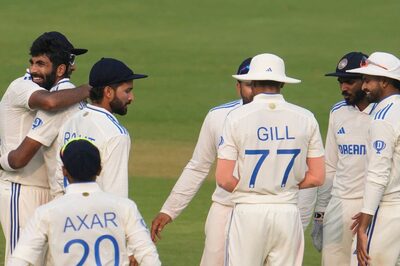
views
The government of India decided to honour Buddhadeb Bhattacharjee with the prestigious Padma Bhushan award, but it led to a rather unpleasant situation. The ailing former West Bengal chief minister’s wife was contacted by the union home secretary, but the news did not please the CPI(M) veteran. He is suffering from age-related ailments and shared the following statement on the communist party’s social media handles: “I know nothing about this award. No one has told me anything about it. If they have decided to offer Padma Bhushan to me, I refuse to accept it.”
This was under the political pretext that he had been criticising the Narendra Modi-led government at the Centre, and the declination came as a display of his moral high ground.
It should be noted that it is extremely rare for someone to repudiate the prestigious Padma awards, as they are conferred by the President under constitutional provisions to honour eminent citizens for their contribution to the nation. Hence, it is an act of dishonouring the country and our Constitution that cannot be justified by referring to party guidelines.
The Padma awards were institutionalised in 1954, and the Padma Bhushan is conferred on individuals who have extended “distinguished service of a high order”. It is among the top civilian awards that recognise achievements in all fields where public service is involved.
It should also be noted that these awards are bestowed upon by the ruling dispensation and not by the ruling party. Having said that, it is quite clear that this honour is beyond partisan politics. Repudiating one by the communist leader under the garb of “communist ideology” only adds to the age-old jibe, satire and charge that communism is against the democratic spirit.
In fact, it is also being said the call was disconnected before the officials could fully communicate the particulars, which is, of course, termed as something unintentional by the CPI(M) leader’s family. This can be termed as an act of gross misconduct as, unlike its predecessors, the incumbent PM Modi-led government has recognised individuals irrespective of their political affiliations.
Although it got a lot of flak and vituperation, this act conspicuously demonstrates the Centre’s magnanimity and cherishes the spirit of a true and healthy democracy. It also emphasises the BJP’s healthy politics, echoing the late Atal Bihari Vajpayee’s famous remark that discord is fine as long as it is not discriminatory. He had remarked, “Mat bhed hona chahiye, mann bhed nahin.”
This evokes an incident from 2013 when former Pakistan PM Nawaz Sharif infamously took a dig at the then Indian PM Manmohan Singh calling him a “dehati aurat”. Thus, debasing village women and traducing Manmohan Singh thereby. Even then, Narendra Modi said, “How dare you (Nawaz Sharif) address my nation’s Prime Minister as a village woman? There cannot be a bigger insult to the Indian Prime Minister. We can fight with him on policies, but this we will not tolerate. This nation of 120 crore will not tolerate its Prime Minister’s insult.”
This act of cutting across party lines is hailed globally as one of the exemplary acts of statesmanship that we recently witnessed in Israel when it was under attack by aggressors in the Gaza strip. Then opposition leader Naftali Bennett supported his incumbent counterpart Benjamin Netanyahu and went on to say, “Don’t stop until Hamas pays the heavy price.”
It has been customary for leaders to put national interests above political differences, but the act of disregarding Padma awards to make political statements is a serious concern for every citizen and even for the future of the communist party.
It can potentially distort the public discourse if it is converted into a trend as it maligns the image of the Indian State nationally and internationally. This raises some stark questions in front of the world’s largest democracy:
According to protocol, the awardee is communicated with regard to willingness to accept the award and, in case, they choose not to accept the Padma award, they are not named. But is it acceptable for an individual to refute and dishonour the Indian State and its Constitution due to difference of opinion with the incumbent government?
Is this a violation of the public mandate and is it an indication of a desire to deny the constitutional recognition of the public mandate?
The present government decided to recognise its political rivals in the national interest. This includes awarding Congress leaders like former president Pranab Mukherjee and Ghulam Nabi Azad. Should the opposition welcome this initiative as a responsible stakeholder in democracy, or should they use it to dilute national interests for political statements?
Why should an ordinary citizen not protest such ill-fated shenanigans?
Should we, as a nation, compromise the assiduous efforts made by the current regime to rise above party lines, work with every stakeholder, and revert to the vindictive, discriminatory, self-appeasing policies of the past governments?
Is it healthy for democracy to expunge the dignity of constitutional honours to communicate differences of opinion?
Are such political stunts and gimmicks in line with the idea of India for which Netaji Subhas Chandra Bose, Sardar Vallabhbhai Patel and Bhagat Singh contributed their lives?
This incident is indeed a dark chapter in both India’s political and historical discourse as it amounts to insulting the president and the Constitution by turning Padma awards into a parley for washing dirty linen at the cost of national pride. Sabotaging national pride in this fashion not only dilutes the spirit of the Constitution but also dilutes the idea of India and the supreme sacrifices made by freedom fighters and armed forces.
It is indeed unfortunate and the Indian public will surely reflect their displeasure not only through the ballot but also by strengthening their voice in support of the democratic ethos.
(Yuvraj Pokharna is a Surat-based educator, columnist and social activist. Views expressed in this article are those of the author and do not represent the stand of this publication)
Read all the Latest Opinions here


















Comments
0 comment